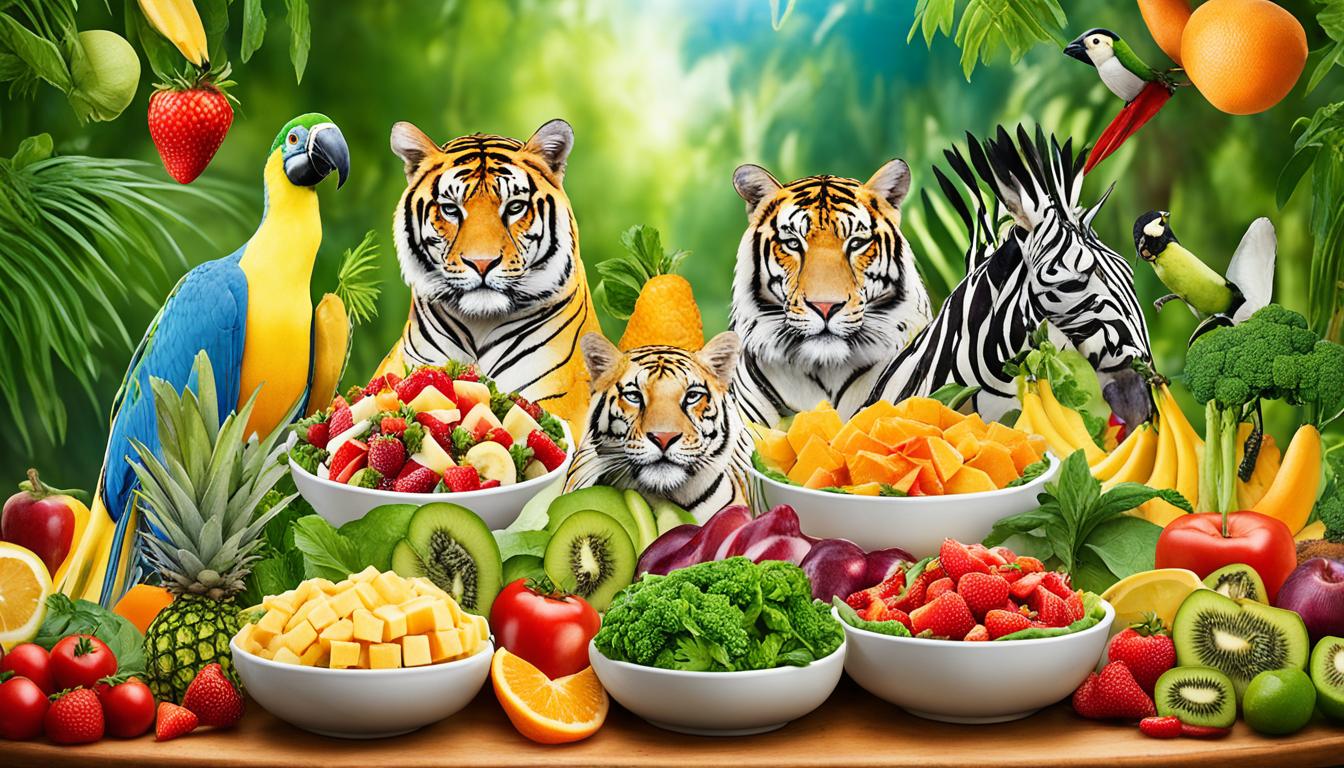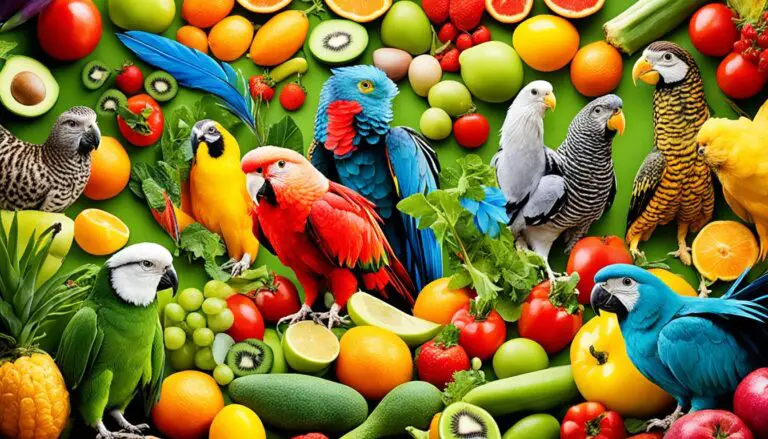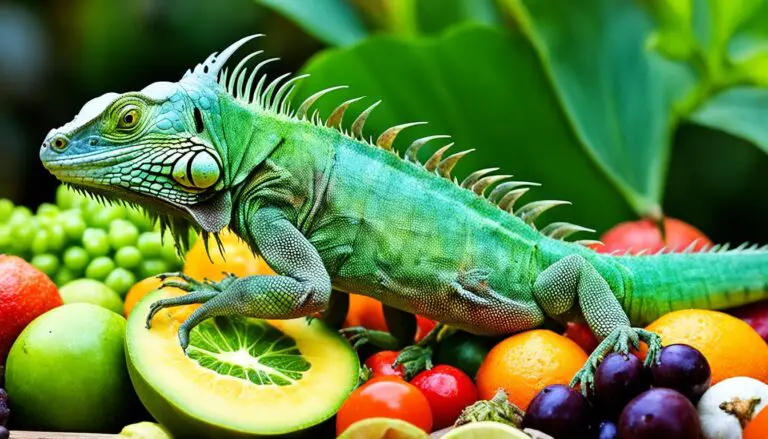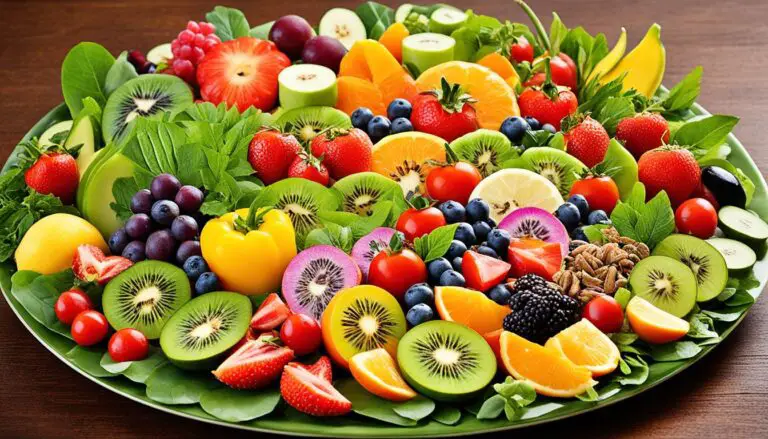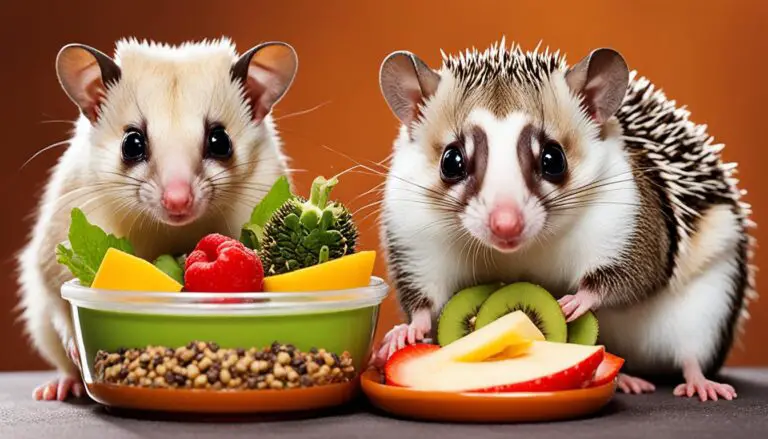Optimal Diets for Breeding Exotic Animals
Providing the right nutrition is vital for breeding exotic animals. It affects their health and how well they reproduce. Exotic Nutrition has been creating special diets for exotic animals for over 25 years.
Key Takeaways:
- Nutritional considerations are critical for breeding exotic animals
- Exotic Nutrition offers species-specific diets for optimal breeding outcomes
- The right diet can enhance fertility rates and support the health of breeding animals
- Proper nutrition varies for different exotic species during the breeding process
- Quality control and collaboration with experts are vital in ensuring optimal nutrition for breeding exotics
Importance of Nutritional Considerations for Breeding Exotic Animals
Good nutrition is key for exotic animals to reproduce successfully. Lack of certain nutrients might cause them to have fewer babies. This makes what they eat very important.
Breeding exotic animals needs a special diet. It must give them the energy they need and all the nutrients for making babies. This is different from what other animals eat.
For plant-eaters, a diet rich in fruits and veggies is essential. Such a diet makes sure they get all they need to stay healthy. But, for meat-eaters like ferrets, they should eat diets high in energy. This helps them during the breeding season.
Nutrition is crucial for breeding exotic animals well. A balanced diet boosts chances of healthy babies. It’s vital to focus on what these animals eat to help them breed and stay healthy.
Feeding Tips for Exotic Animal Breeding:
- Give herbivores plenty of fruits and veggies for a healthy gut.
- Ferrets and meat-eaters need high-energy foods for breeding.
- Get advice from experts in exotic animal diets for the best plans.
- Keep an eye on what they eat and adjust as needed for breeding.
With the right feeding tips, breeders can improve their animals’ health and chances of making babies.

Nutritional Needs of Exotic Breeding Species
For exotic animals to breed well, knowing what they should eat is key. Each type of animal has unique food needs when breeding. Giving them the right diet boosts their health and helps them reproduce better.
Herbivorous animals need lots of fiber and less protein. This helps their teeth stay healthy and their digestion smooth. Such a diet stops problems like constipation. Breeders make sure these animals get what they need, helping them breed successfully.
Carnivores, however, need more energy when they breed. For instance, ferrets benefit from diets full of protein and fat. This energy-rich food keeps them healthy and ready for breeding.
Breeders who understand what their animals need can offer the best diets. The right nutrients support breeding and make animals more fertile. This means a better chance of healthy babies being born.

A carefully planned diet is essential for the breeding success of exotic animals. Breeders prepare meals that match each animal’s unique needs, ensuring their well-being and good breeding health.
Feeding Strategies for Exotic Breeding
Breeding exotic animals successfully means meeting their unique dietary needs. This goes a long way in ensuring they’re healthy and ready for reproduction. At each breeding stage, from preparation to lactation, the right kind of nutrition is key. This involves feeding them more protein, maybe even some special supplements to support their reproductive needs. The health of breeding animals and the success of their offspring depend on this.
Exotic animals need a diet that fits their specific needs. By providing balanced and nutrient-rich food, breeders can achieve better outcomes. This includes enhancing reproductive processes and increasing the chances of healthy babies.
Feeding Strategies by Breeding Stage
Before they reproduce, exotic animals should eat a diet that boosts their health. It helps them get in the right condition for successful breeding. This diet keeps them healthy and set up for what’s to come.
During mating, these animals need more energy. A diet higher in protein can help, as can special supplements. Adding essential vitamins and minerals supports their reproductive success.
The gestation diet supports both the mom and her growing baby. It needs to be rich in nutrients, especially important minerals and vitamins. Giving the best food is vital for a healthy pregnancy.
When it’s time to nurse, the mother needs the most nutrition. Her diet should focus on making quality milk and keeping her energy up. Foods with proteins, fats, and essential minerals are ideal for this stage.
Watching the animal’s health throughout the breeding cycle is a must. Diet tweaks might be needed as their needs change. A vet or a nutrition expert for exotic animals can offer great advice.
Benefits of Specialized Diets
“Special diets are crucial for exotic animals’ breeding success. They’re designed to meet the major demands of breeding. By using these diets, breeders can make sure their animals are at their best for breeding. This leads to healthier babies and an overall more successful breeding process.”
Nutritional Strategies for Exotic Breeding
| Breeding Stage | Nutritional Considerations |
|---|---|
| Preparation | Optimal body condition and overall health |
| Mating | Higher protein content, supplements supporting reproductive functions |
| Gestation | Balanced diet, essential nutrients for fetal development |
| Lactation | Support milk production, high-quality proteins and fats |
Good nutrition is the foundation of successful breeding. With the right feeding strategies, tailored to each stage, breeders can ensure top-notch nutrition. This boosts the chances of healthy babies.
Nutrient Requirements for Exotic Breeding
It’s vital to give exotic animals the right nutrients for breeding success. Each type and stage of breeding has its own needs. They must be met for the best chance at healthy babies. Nutrients like protein, fat, vitamins, and minerals are key. They help with making babies and keeping breeding animals healthy.
Protein does a lot for animals trying to make babies. It gives them the building blocks they need for making eggs or sperm. It even helps with the important reproductive hormones.
Fat is also important for breeding animals. It gives them an energy boost when they need it most. Fat helps the reproductive system work right and protects the baby animals growing inside.
Vitamins and minerals are super important during baby-making. They help with making hormones, keeping the immune system strong, and other body processes. For example, vitamin E is a must for good reproductive health. Minerals like calcium and phosphorus help the baby animals grow strong bones.
It’s a must to feed breeding exotic animals a balanced diet. This diet should be full of top-quality food to meet all their nutrition needs. Using food from a trusted brand that’s made just for them is a smart choice. It will make sure they get all the nutrients they require.
Example Table: Key Nutrient Requirements for Exotic Breeding
| Nutrient | Function | Sources |
|---|---|---|
| Protein | Aids in reproductive tissue development and hormone production | High-quality animal protein sources, such as meat and insects |
| Fat | Provides energy, supports reproductive system development, and aids in embryo protection | Healthy fats from sources like fish oil and plant oils |
| Vitamins | Supports hormone synthesis, immune function, and overall metabolic processes | Fruits, vegetables, and vitamin supplements formulated for exotic animals |
| Minerals | Essential for bone formation, hormone regulation, and various physiological functions | Naturally rich mineral sources like bone meal and mineral supplements |
Note: The exact nutrient requirements may vary depending on the species and specific breeding goals. It is important to consult with a qualified exotic animal nutritionist or veterinarian to ensure the diet provided meets the unique needs of each breeding animal.
Optimal Diet for Breeding Exotics
Feeding exotic animals the right diet is crucial for their health and breeding success. An ideal diet gives them all the energy and nutrients they need. It helps boost the chances of producing healthy babies.
Exotic animals have different nutritional needs during breeding. It’s vital to adjust their diets as these needs change. A diet designed for breeding should support energy, offer key nutrients for reproduction, and help babies grow strong.
For the best advice on exotic animal diets, talk to experts like exotic animal nutritionists. They know exactly what each species needs at every breeding stage.
Supplements also matter for breeding animals. They can provide extra nutrients and vitamins needed for successful breeding. Including supplements in their diet can improve your exotic animals’ health and breeding success.
| Benefits of an Optimal Diet for Breeding Exotics | Key Considerations for an Optimal Breeding Diet |
|---|---|
|
|
Expert Insight: Nutritionist’s Perspective
“Choosing the right diet is key for successfully breeding exotic animals. Each species has unique nutritional needs. Customizing their diet can boost breeding success and keep them healthy.”
Dr. Emily Johnson, Exotic Animal Nutritionist
In summary, breeding exotics successfully demands a diet that supports their health and reproduction. Tailoring their diets to meet specific nutrient needs and adding supplements is crucial. Getting advice from nutrition experts is essential in crafting the perfect diet for your exotic breed.

Importance of Quality Control in Exotic Animal Diets
Feeding breeding exotic animals the right diet is key to their health. Exotic Nutrition knows the importance of top nutrition for your pets. We test food thoroughly and use detailed feeding trials to ensure the best diet.
“Quality control is critical for a healthy diet for exotic animals. We use microscopes to check the food’s nutrients and vitamins. Our trials also test if the food is tasty and if it helps with breeding, making sure it’s both healthy and delicious. With us, your pets will enjoy the best nutrition.” – Dr. Emily Johnson, Exotic Nutrition Nutritionist
Picking carefully in who you trust for your pet’s diet is crucial. It makes sure the food is nutritious, fresh, and safe. Choosing sources like Exotic Nutrition means you’re picking the best for your pets.
We are serious about our diets being the best. Here’s how we check at Exotic Nutrition:
| Quality Control Process | Benefits |
|---|---|
| Microscopic examinations | Ensures accurate nutritional values and vitamin content |
| Feeding trials | Monitors palatability and breeding results |
| Veterinary collaboration | Validates effectiveness through expert input |
Our steps in quality control mean you give your pets outstanding nutrition. Good food is vital for breeding success and the health of both parent and baby animals.

Choose Quality, Choose Exotic Nutrition
For your breeding exotic pets, only the best nutrition will do. Depend on Exotic Nutrition for meticulously researched diets. With our focus on quality control, you know your pets get the best. Check out our tailored diets today.
Resources for Exotic Animal Owners
Exotic Nutrition supports those with exotic pets. They share info on pet care, raising, and breeding. This helps owners make smart choices about their pets’ nutrition and health. Knowing this, they can give the best care and avoid health issues.
On Exotic Nutrition’s site, owners find many useful resources.
- Exotic Pet Care Guide: This guide helps with diet, housing, fun, and health for exotic pets.
- Breeding Program Information: It offers breeding tips, like setup, what to feed, and care during breeding.
- Special Species Care Sheets: For specific species, these sheets cover food, homes, and general care tips.
- Help Center: A place for commonly asked questions and expert advice in exotic pet care.
These tools are for excelling in caring for exotic pets. They help make sure pets eat well and are happy. With this help, breeding can be successful and pets can thrive.
Endorsement and Compliance
Exotic Nutrition focuses on top-notch pet supplies and supports groups aiming to help exotic animals. They work with qualified folks, like veterinarians and breeders, to ensure their food is top-notch. Also, they follow strict USDA and FDA rules at their manufacturing site.
You can trust them because they clearly list all ingredients and proof of quality on each food bag.
Benefits of Choosing Exotic Nutrition
Choosing Exotic Nutrition means giving your exotic pets the best. They work with experts to meet specialized dietary needs. Plus, their operations meet the highest quality standards thanks to stringent checks by the USDA and FDA.
- You get all the info you need on what you’re feeding your pets. This helps you choose wisely for their nutrition.
By picking Exotic Nutrition, you help your pets stay healthy and support their breeding and the health of their babies.
| Benefits of Exotic Nutrition’s Endorsement and Compliance | Why it Matters |
|---|---|
| Collaboration with qualified veterinarians and breeders | Ensures diets meet unique nutritional needs |
| USDA and FDA registrations | Guarantees stringent manufacturing processes |
| Inclusion of ingredient lists and guaranteed analysis | Allows informed decisions about nutrition |
Charitable Initiatives by Exotic Nutrition
Exotic Nutrition doesn’t just focus on high-quality food for exotic animals. They’re also big on helping animals in need. They give regularly to rescues and rehab centers to support animals.
They realize exotic animals often need special care, especially if they’ve been abused or abandoned. By backing these places, Exotic Nutrition helps animals get a new shot at life.
Exotic Nutrition joins special fundraisers to make a big difference. These events gather money for animal welfare causes. Their efforts both raise awareness and collect much-needed donations.
Exotic Nutrition’s help stretches beyond food. They also aid with medical care, provide places for animals to thrive, and help them recover. This shows their deep care for animals and their well-being.
Curious about how they help through charity? Go to Exotic Nutrition’s website to find out.
Table: Charitable Initiatives Supported by Exotic Nutrition
| Organization Name | Cause Supported |
|—————————|——————————————-|
| Wildlife Rescue Center | Rehabilitation and Release |
| Exotics Sanctuary | Long-term Care and Sanctuary |
| Rehabilitation Hospital | Medical Treatment and Rehabilitation |
| Animal Adoption Program | Finding Forever Homes for Exotic Animals |
| Conservation Society | Preservation of Endangered Species |
| Wildlife Research Fund | Advancing Scientific Knowledge |
*Note: The table lists organizations Exotic Nutrition helps, along with the work they do. For more about their charity work, check out their website.
Conclusion
Providing the best nutrition is vital for breeding exotic animals successfully. To do this, we have to know what each species needs when it comes to food. Then, we can create diets that meet their requirements at every breeding stage. Choosing top-quality food is a must, and experts in exotic animal nutrition can offer great advice. They help us make sure we’re feeding exotics the best possible diet.
FAQ
Why is optimal nutrition important for breeding exotic animals?
How does the diet of breeding exotic animals differ from non-breeding animals?
What are some feeding tips for breeding exotic animals?
Do different exotic species have specific nutritional needs during the breeding process?
What are some feeding strategies for breeding exotic animals?
What are the nutrient requirements for breeding exotic animals?
What is the optimal diet for breeding exotics?
Why is quality control important in exotic animal diets?
Are there any resources available for exotic animal owners?
How does Exotic Nutrition ensure compliance and quality in their diets?
Does Exotic Nutrition have any charitable initiatives?
Source Links
- https://www.merckvetmanual.com/management-and-nutrition/nutrition-exotic-and-zoo-animals/nutrition-exotic-and-zoo-animals
- https://exoticnutrition.com/blogs/blog/exotic-nutrition-foods
- https://www.vettimes.co.uk/app/uploads/wp-post-to-pdf-enhanced-cache/1/nutrition-for-exotics-correct-diets-will-prevent-problems.pdf
Peter Stones is the founder of Exotic Pets Place, the leading online resource for exotic pet care information.
With over 10 years of hands-on exotic pet ownership experience, he is deeply passionate about sharing his expertise to help others properly care for their unusual pets.
When he's not writing extensively researched articles or connecting with fellow exotic pet enthusiasts worldwide, you can find Peter at home tending to his own beloved menagerie of exotic animals.

